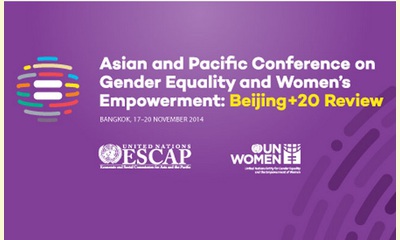|
|
UN Asia-Pacific forum opens meeting to advance gender equality
un articulo por UN News Centre
More than 700 representatives from governments,
inter-governmental organizations, UN bodies and
civil society in Asia and the Pacific began meeting
today [19 November] to advance gender equality
and women’s empowerment with the keynote
speaker highlighting the urgency of eliminating
violence against women and girls. 
click on photo to enlarge
The “Asian and Pacific Conference on Gender
Equality and Women’s Empowerment: Beijing+20
Review” is being convened in Bangkok, Thailand
by the UN Economic and Social Commission for
Asia and the Pacific (ESCAP), in cooperation with
UN Women, from 17 to 20 November.
In her keynote address at the opening of the
conference, Her Majesty Ashi Sangay Choden
Wangchuk, the Queen Mother of Bhutan,
highlighted the urgency of eliminating violence
against women and girls.
The “eradication of violence from the lives of
women and girls, along with peace, democracy
and sustainable development in the region, will
become possible when women and girls are
valued, when their ability to fully and freely
exercise their human rights is wholly supported,
when there is equality in the exercise of power
and when decisions are made to fully resource
comprehensive and evidenced-based
interventions,” she said.
ESCAP Executive Secretary, Dr. Shamshad
Akhtar, in her opening address to more than 700
participants including ministers and
representatives of civil society said the
Conference “provides a unique opportunity to
recommit Asia and the Pacific to the goal of
gender equality and the means of accelerating the
realization of human rights and opportunities for
all women and men, girls and boys.”
Over the next two days, delegates to the
Conference will discuss and identify strategies for
accelerating implementation of the Beijing
Platform for Action, adopted by the 1995 Fourth
World Conference on Women, as a key means of
achieving gender equality, including such
measures as strengthening Government
institutions and accountability, forging stronger
partnerships and enhancing financing.
The Asia-Pacific Conference concludes on 20
November with the anticipated adoption of the
“Asian and Pacific Ministerial Declaration on
Advancing Gender Equality and Women’s
Empowerment,” which will serve as the regional
voice in next year’s global discussions and
agenda setting.
In her video message to the Conference, the
Executive Director of UN Women, Phumzile
Mlambo-Ngcuka, said: “Member States are
moving into the final stage of crafting the post-
2015 development framework, it is vital that in
your regional and global development cooperation
you remain vigilant in this process to maintain a
strong gender goal as well as the targets and
indicators on gender equality across other goals.”
|








|
DISCUSSION
Pregunta(s) relacionada(s) al artículo :
Prospects for progress in women's equality , what are the short and long term prospects?
* * * * *
Comentario más reciente:
The following figures, very revealing, come from the website of the American White House.
. * . * . * . * .

. * . * . . ... continuación.

|
|










